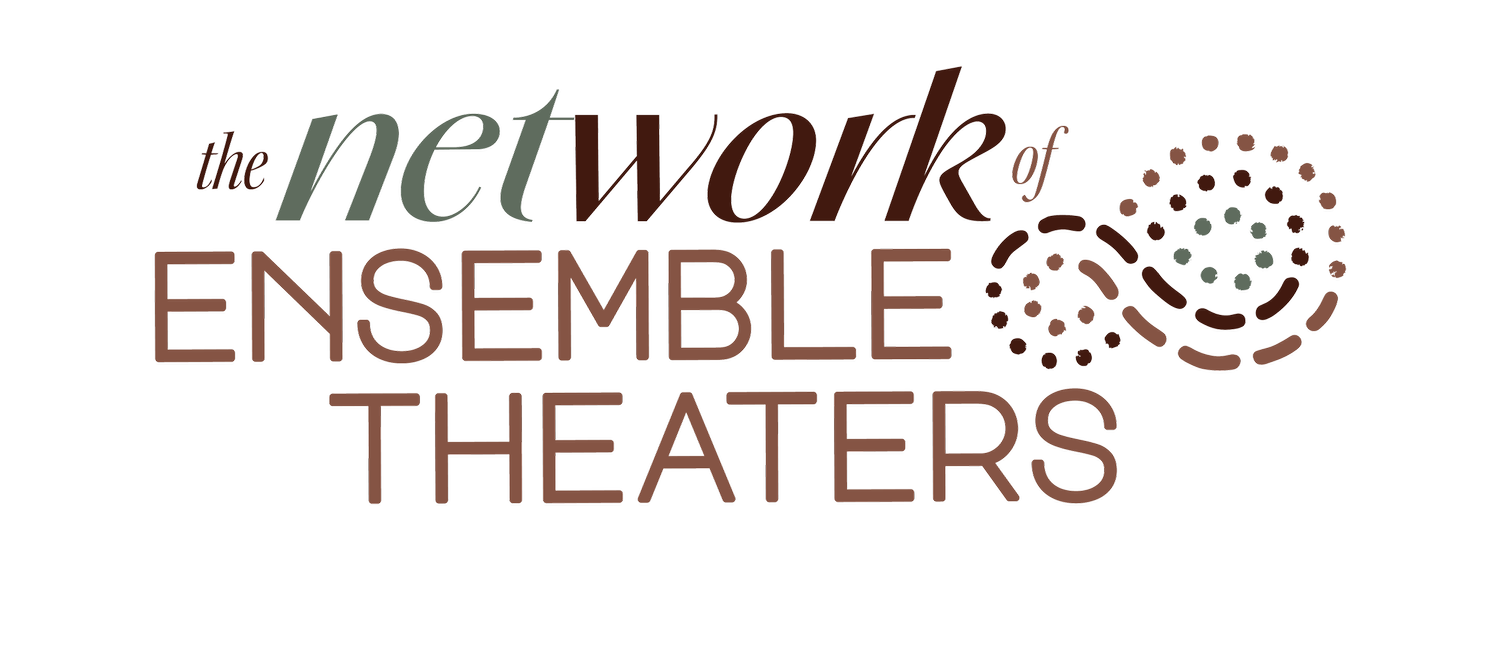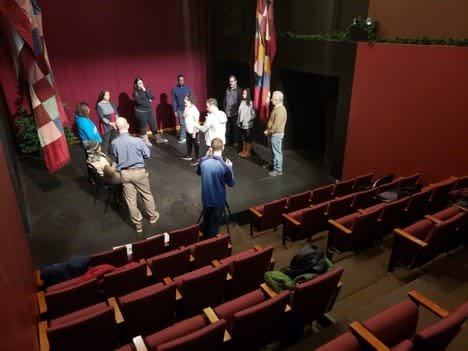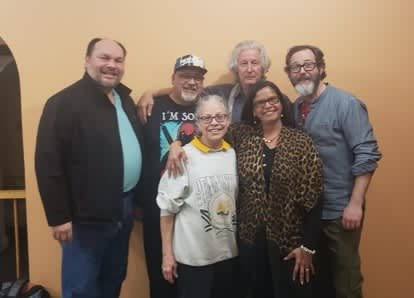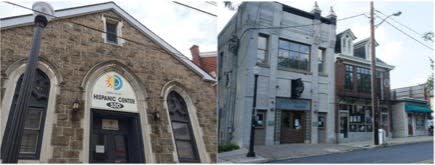NET/TEN Shareback: Touchstone Theatre and Pregones/PRTT - Five Insights (with one Bonus) Towards a More Effective Cross-Cultural Collaboration
Touchstone Theatre (Bethlehem, PA) and Pregones/Puerto Rican Traveling Theater (Bronx, NY) engaged in a yearlong intercultural and intergenerational exchange centering on strategies for art-centered community engagement. Working in English and Spanish, the project engaged a diverse group of Anglo, Latinx, and other participants in ensemble-based playmaking, leading to a headline performance in the October 4-13 Festival UnBound in Bethlehem, PA.
SHAREBACK:
Five Insights (with one Bonus) Towards a More Effective Cross-Cultural Collaboration
As part of a large 10-day festival called Festival UnBound, produced by Touchstone Theatre and designed to bring our very diverse community of Bethlehem, Pennsylvania, together to “envision the future through art, Touchstone Theatre, contacted sister ensemble, Pregones/PRTT in the Bronx, New York, to help facilitate an art performance growing out of the concerns and people of our local Latinx citizens.
An elaborate strategy was designed (and re-designed) as the two companies collaborated to conjure a bi-lingual, community-based work for the general audiences of our Festival—while laying the foundations for a possible Spanish language theatre here in Bethlehem and studying each other’s methodologies, philosophies, and personal and ensemble trajectories. Both companies have over 40 years of continuous creation in the field and twice before worked together.
Note: there are any number of ways to accomplish one’s collaborative goals. These experiences helped fashion our methodologies and understandings; they are intended to assist, to provide insights as to how you might wish to tailor your particular collaboration. Each collaboration is unique.
1: Color in the Big Picture Early On
“Build Informed by Context”
Community-based work requires seeing and understanding one’s resources, most importantly the culture and people who are to be your creative partners – not just in the moment, but how we all got to this point as well, context.
One of the key elements to the success of this exchange was a sight-seeing tour. When Omar Perez arrived, Pregones’s point person for the project and leader of the work here in Pennsylvania (all building towards a final community-based production called Embracing Bethlehem/Abrazos a Belén), he and Bill George, Project Coordinator, went on a long walk and drive around the City. Bill elaborated how the land had been stolen from the Lenni-Lenape; the Moravian settlers original utopian and spiritual ideals; the long oppressions of North Side over South Side, divided by a river that was still owned by local industry until the mid-1970’s; how the Mexican population first arrived in box cars to provided needed labor for the Steel, Bethlehem Steel; demographic statistics; key Latinx landmarks, views from South Mountain out over the entire city so that our community could be palpably understood through how the City and environs were laid out.
And then, when the Pregones Ensemble joined Omar for final rehearsals and the co-creation of Abrazos with our local Latinx allies, we did the tour again for the whole team. In two cars. We couldn’t all fit into one vehicle, so Bill, in the first car with a phone, spoke to those in Car 1 and to those in Car 2, the car behind, who were listening on speaker phone. It felt a bit silly, but more importantly, it was very helpful to the Pregones team.
In an exchange, as this was, context needs to reach out both ways. Touchstone team visits to Pregones’s summer block party and Stage Garden Rumba off-site performances were one of the crucial ways Touchstone reciprocated and educated as to where Pregones was “coming from”. It would have been better if Touchstone could have gotten our key local “allies” to go with us to the Bronx, but that proved unmanageable.
2: Workshops Build Community
“Never Give Up”
Workshops by Omar and the greater Pregones ensemble were originally conceived as our primary way of building a local ensemble, generating material, and teaching performance skills. But in the end, that didn’t really pan out for us, largely because we couldn’t get large enough or consistent attendance. (See #3 & #4) Our workshops were important though, in spite of our failure to find performers or generate material through them; they helped provide us a meeting place for conversation and planning, and it was then possible to make the connections to people who could, over the phone, at meals, or at one-on-one, sit-down conversations, guide the work. The epitome of this was the connection we made with Olga Negron. She was sick with the flu, but came to one of the early workshops at Touchstone, just to watch. From our connection with Olga, many doors in the community opened—to collaborators, audience, and promotion avenues.
3: Local Allies
Choosing Your Team
From the beginning of our vision for this collaboration with Pregones, we both knew we couldn’t achieve our goals without building allies, here on the ground in Bethlehem. That shouldn’t have been too hard as we’d decades of work in the Latinx community – but we’d never consciously focused our work over the years on building long-term allies, taken the additional steps of nurturing relationships across projects. Even with Abrazos, it was our first impulse to cast a net widely, see who shows up, get ideas from everyone about what needs to be done. Sure, we called our main “go to” friends in the Latinx community to ask them to join us if they could, but we didn’t assemble them first, empower them to take part in shaping the event from the start; the relationships had been allowed to drop, and we couldn’t start from that place, even if we’d known to.
The trajectory of work on Abrazos saw a mid-course correction in order to address this issue. Instead of workshops for the general Latinx community, Omar and Bill went from known ally to ally, interviewing them – even through phone calls to Puerto Rico or in their own homes. In this way material was developed for the final production and the roots of our local leadership team largely strengthened into existence.
In building allies in the community, one very often has to work from “scratch”, bringing forth “theatre people” out of those who don’t necessarily think of themselves that way, or you, the organizer, either. And what are the criteria by which one chooses who will make a good ally? Interest? How can those who don’t know the importance of theatre be interested? Skill? Knowledge? Quite often, those who are trained in the field have their “plates full”, are burned out, or have their own independent agenda. To build allies, often one must be able to look past the social persona of those around you or that you’ve met at workshops to look deeper into who they are as people. Margarita, for instance, in the picture below, has been a wonderful actress in a number of Touchstone productions, bi-lingual and in English. She runs a house cleaning service. I wouldn’t have thought to see her as an artist and a leader, but she is.
4: Safe Venues
“Go to Their Safe Places”
For decades, off and on, Touchstone has produced Spanish language companies, original bilingual street theatre, bilingual community-based works, and yet it has been our experience, once those productions are done, the Spanish speaking community is no longer interested in coming to our theatre to see anything else we might provide. As we reached out to that community, particularly our Puerto Rican neighbors, it became clear they were not entirely comfortable, didn’t entirely feel “safe”, coming to Touchstone, unless it could be more determinedly “welcoming”. For various reasons, if we were to hold a workshop in the Hispanic Center, just two blocks down the street, all the signals were go—with very good attendance by those who were already accustomed to using that space, the elderly. Even if we were to hold it at the Boys Club, just a block the other way, or at the local Middle School, Broughal, results were better than having it in our own theatre.
As the collaboration progressed, we became increasingly aware that, as Olga and Rosalba would say: “you must meet the community where it is.” When dealing with historically oppressed cultures, as a rule, they’re not going to trust you if you’re of the dominant culture. Does that really need to be said out loud? But, over time, a theatre can be made into a “safe place” – through regular invitations for the community to share their art there, through special productions that augment their cultural life, through Spanish-language communications, through overt, sincere and concerted interest in them. Over time, continuously, one can build trust.
5: Play Together
For the professionals on the team, competition, differing creative vocabularies and artistic priorities, present roadblocks to trust and smooth collaboration as well. Few of us have gotten through our training and our personal struggles to create art without teacher- and self-inflicted wounds, painful judgements and fears. One of the strongest bonds connecting the two ensembles (Pregones & Touchstone) was built towards the end of the exchange process when Rosalba led us in a simple but fruitful improvisation provided by Alejandra Ramos of the Pregones Ensemble:
We collectively created a four or five word prompt for our year-long exchange, ending up with: “Under a Bridge of Bread” (Bethlehem meaning House of Bread in Hebrew)
Mixing the two ensembles up into three groups based on artistic inclinations: Word People, Movement People, and Music People.
We separated and over perhaps fifteen minutes generated three responses (in word, movement or music) to that prompt.
We then came back together to put the mud pies side by side, interplaying with each other.
It looked, in part, like this (after lots of laughter and only one false start):
https://www.dropbox.com/s/i5fx507jdok9dkc/pregones%20-%20touchstone%20...%20improvisation.mp4?dl=0
Furthermore, both Omar and Bill had studied with the American Mime master, Paul Curtis, in NYC. Sharing that vocabulary and training experience undoubtedly eased communications and trust.
And the Bonus Is:
Don’t underestimate the importance and power of eating together. In small and large groups. Whenever you can. In places where you can hear each other and talk in depth, tell long stories, where you can share food from each other’s culture. The bond of sharing a meal is ancient magic.
Photos:




